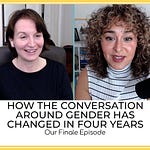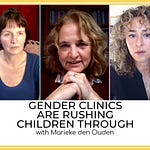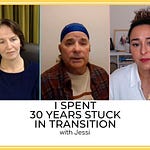Looking for support as a parent of a gender-questioning youth or young adult? Attend a Wider Lens Parent Retreat in 2025! Registration is now open. Visit https://widerlens.events/parent-retreat-2025 to learn more and secure your spot.
Sasha and Stella welcome mother and advocate, Lydia, to the show for an insightful discussion about the emotional and relational dynamics impacting boys experiencing gender dysphoria.
(Note: ROGD stands for Rapid Onset Gender Dysphoria and is a term first coined by Lisa Littman. You can learn more about it in our Episode #2.)
Many families with boys experiencing gender dysphoria encounter a distinct set of challenges rooted in the intersection of social expectations, emotional needs, and emerging gender identity beliefs. Unlike their female counterparts, boys often find themselves navigating a world where expressions of vulnerability or gentleness are less socially accepted, leading some to seek alternative ways to connect and express their identity. For some boys, gender identity beliefs may offer a pathway to intimacy and belonging, particularly through access to female friend groups, where they feel embraced with tenderness and acceptance—elements often missing in traditional male peer dynamics.
This dynamic highlights a critical need to understand the emotional and relational factors influencing boys with gender dysphoria, especially as parents work to support their children while addressing the broader social forces at play.
Lydia is a passionate advocate and representative of a coalition comprised of parents, health experts, professional educators, and concerned citizens focused on the medicalization of young men and boys grappling with gender identity confusion. With a PhD in biochemistry and over 20 years of experience in both K-12 and higher education, Lydia brings a unique perspective to this critical issue.
She is married to another PhD scientist and is the mother of several children, one of whom began identifying as “gender fluid” at the age of 14 during the pandemic. Due to significant physical disabilities that complicate medication use, Lydia and her family embarked on a thorough investigation of the pressures to medicalize their child. Their findings sparked alarm and led to the creation of the website ROGDBoys.org, which aims to raise awareness and provide vital information about the impact of medical interventions on boys and men with gender identity confusion. She has also contributed to PITT (Parents with Inconvenient Truths about Trans) articulating her concerns about the politicization of medical best practices and the lack of scientific rigor in current literature.
In this episode, Lydia shares her reflections about:
Her son’s experience with gender dysphoria, sparked by an online quiz claiming he was "80% girl"
The profile of boys often drawn into gender identity beliefs, including their intelligence, black-and-white thinking, and affinity for structured systems
How Lydia's upbringing in a high-control religious environment informed her understanding of the control tactics influencing her son
The dissonance between scientific thinking and simplistic notions of gender transformation, and how cultural narratives exacerbate this confusion
The importance of understanding how sexuality and identity are intricately tangled and the social dynamics that make gender identity beliefs appealing to some boys, particularly the allure of gentleness and access to 'safe' intimacy within female friend groups
Her caution against reducing AGP to a plain-and-simple, black-and-white conclusion, framing it instead as a complex challenge of integration and shame driving the sense of dysphoria
The conversation also emphasizes the importance of recognizing the diversity of families affected by gender dysphoria, dismantling the notion that parenting style determines outcomes. And sheds light on the critical work of ROGDBoys.org and their mission to ensure boys and their families are supported, understood, and less commonly overlooked.
Resources & Links
ROGD Boys Website
@rogd_boys_exist on X
Testifying, PITT article













